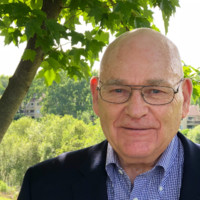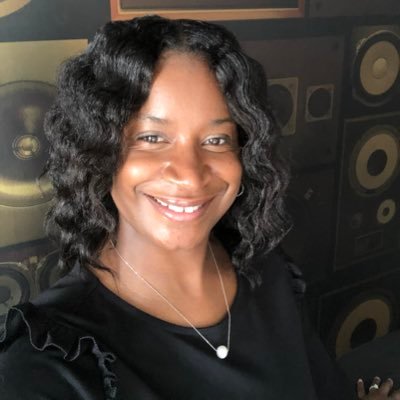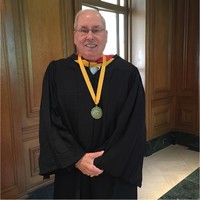About Jonathan W White

Jonathan W. White is a professor of American Studies at Christopher Newport University. He is the author or editor of 21 books that cover a variety of topics related to Abraham Lincoln and the Civil War. Among his awards are the State Council of Higher Education for Virginia’s Outstanding Faculty Award (2019), CNU’s Alumni Society Award for Teaching and Mentoring (2016), the Abraham Lincoln Institute Book Prize (2015), the University of Maryland Alumni Excellence Award in Research (2024), the Jack Miller Center’s Teaching Excellence Award (2024), and the Penn State History Department’s Outstanding Alumni Award (2025). His recent books include A House Built By Slaves: African American Visitors to the Lincoln White House (2022), which was co-winner of the Gilder Lehrman Lincoln Prize (with Jon Meacham); Shipwrecked: A True Civil War Story of Mutinies, Jailbreaks, Blockade-Running, and the Slave Trade (2023); A Great and Good Man: Rare First-hand Accounts and Observations of Abraham Lincoln (2024); an exciting new children’s book, My Day with Abe Lincoln (2024); and Measuring the Man: The Writings of Frederick Douglass on Abraham Lincoln (2025).

Blue Ocean: Tell us about your professional journey. What first inspired you to study Abraham Lincoln, the Civil War, and the Constitution?
Jonathan W. White: I was always interested in American history. I grew up in Philadelphia, which is a very historic city in the United States, and about two hours west of where I grew up was Gettysburg, the site of the most important Civil War battle. I actually grew up in a house from the 1720s and as a kid I went out back into the woods and found the old trash pits. I would dig up artifacts from a hundred, or even two hundred years ago. I think being able to hold things like that really instilled a love of history in me. My dad was a history major. He and my grandfather used to share family stories with me. All of this came together to strengthen my love of history.
I started college at Penn State as a business major. During my first year, I took a history class, and I immediately fell in love with it. I decided this was the direction I was going to go, so I switched from business to history and then went on to get my master’s and PhD, and I’ve been teaching since 2009.
I was always interested broadly in the American Civil War. But in 2009, I went to a Lincoln conference where I told a scholar about a letter I’d found written in 1863 that described a certain aspect of Lincoln’s civil liberties policies, specifically the arrest of people for disloyalty during the war. He encouraged me to write something about it, and I actually ended up writing a whole book about the man who had written the letter. That experience drew me into the Lincoln field. Lincoln scholars began inviting me to give lectures, where I shared this story, and then they kept inviting me back. In that sense, I just fell into writing about Lincoln.
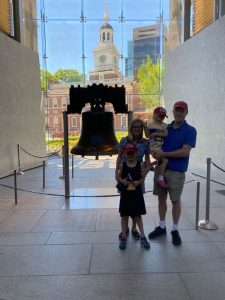
Blue Ocean: What does a typical day look like for you as a historian, professor, and writer? How do you balance research, writing, teaching, and public engagement?
Jonathan W. White: I think it just has to do with time management. I come into the office every day, even if it’s a day that I’m not teaching. I don’t think most college faculty do this; many prefer to work from home or focus on other things. I come in and in between meetings, I’m always working to balance different projects simultaneously.
I just finished a book on Abraham Lincoln and Frederick Douglass, and I’m setting up lectures related to it. At the same time, I’m writing a book about the Lincoln home in Springfield, Illinois. In addition, I’m editing a collection of accounts written by people who met Lincoln during his lifetime, and a collection of essays by famous Lincoln scholars about why they think it’s important to study Abraham Lincoln.
So I have a lot of projects going at once, but they are all related since they all focus on Lincoln. And when I get tired of working on one, I can switch to another. That way I’m always making progress across different projects.
It seems like it’s a lot, but I enjoy it. It doesn’t feel like work, because even though it is, shifting between projects makes it feel like I’m taking a break.
Blue Ocean: You’ve published 21 books and more than 100 articles. What do you believe has been key to your success in producing such a consistent and meaningful body of work?
Jonathan W. White: I try to find things that other people haven’t done. I don’t have any interest in writing a biography of Abraham Lincoln because there are so many of those, and it just doesn’t interest me to repeat information. I try to find angles that are unique and that people will find interesting.
A couple of years ago, I wrote a book titled Midnight in America. It’s about what people dreamt about during the Civil War. We spend a third of our lives asleep, and yet historians have largely ignored that part of the human experience. I had the idea to research what people dreamt about and what sleep was like for people during the Civil War. The book even includes a chapter on Abraham Lincoln’s dreams, because we know of a handful of dreams that he had, some of which were potentially quite disturbing for him. For example, he had dreams that some believe foretold his death.
I think part of my success as a writer comes from projects like that, where I find an angle that nobody has explored before, opening a new window into the experience of people who lived in Lincoln’s time. So in everything I write, I try to think about what we don’t know yet, and how I can understand it and turn it into an interesting story for readers.
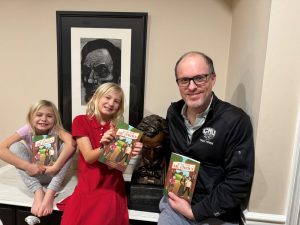
Blue Ocean: From your perspective, what do you think sets your approach to the study of Lincoln and the Civil War apart?
Jonathan W. White: I think it’s that I try to find different angles to explore his life, or that I’ve uncovered new sources. One of the nice things about studying Abraham Lincoln is that there’s no shortage of letters and documents, many of which are buried in the National Archives. There are tens of thousands, even hundreds of thousands of documents from Lincoln’s administration, and no single person can go through them all. So, if, as a scholar, I’m able to find something hidden in plain sight for all these years and no one has noticed before, it gives me a new angle on something that might otherwise seem familiar to people. Last year I even published a book based on accounts of Lincoln that appeared on eBay, something no one had ever thought to do before!

Blue Ocean: In your experience, what qualities separate those who excel in their field from those who don’t?
Jonathan W. White: I think doing historical research is a bit like detective work. You find one piece of evidence, maybe a letter somebody received, and then you track down the other half of the correspondence. It really takes perseverance, and that’s what often makes the difference between a successful historian and one who isn’t able to finish a book, dissertation, or project.
As nice as it is to have digitized sources, like I mentioned earlier, there’s still so much that has never been digitized. So, figuring out how to find the next piece of evidence is often really challenging, and it takes a certain amount of creativity. Not everyone has either the doggedness to keep going or the creativity to figure it out.

Blue Ocean: As someone who works closely with students and public institutions, how do you approach mentoring the next generation of historians and writers?
Jonathan W. White: When I encounter students who want me to mentor them in research, I usually start by showing them how to transcribe 19th-century documents. After that, I teach them how to annotate what they’ve typed, figuring out who the people that are mentioned in the letters are. Using this process, I’ve co-authored three books with students, and I have a fourth that is currently under review with a university press.
For instance, I found the diaries of a Civil War soldier, and over the course of about three or four years, I worked with a student to type out everything he wrote and then annotate it. We added footnotes explaining who each person he mentioned was, and eventually we were able to publish it as a book called From Dakota to Dixie: George Buswell’s Civil War.
So most of the work I’ve done with students to get them “doing history” has been through digging into old documents and then turning them into books or articles.
Blue Ocean: Is there a particular moment or event from the Civil War era that has especially marked you?
Jonathan W. White: I’ve thought a lot about this. I do a lot of political history, and have written extensively about the election of 1864. It’s incredible that the United States was involved in a Civil War and yet still held a presidential election. If ever there was going to be an election that could have been canceled it was that one. Lincoln could easily have said, “oh, we just can’t hold an election right now, there’s too much going on.” But he insisted that the election be held, and I’ve always thought that was pretty remarkable.
In many ways, I think that election is the most important election in American history, because if Lincoln had lost, there’s a very good chance the Confederacy might have gained independence. That makes it truly a pivotal moment for me.
Blue Ocean: What advice would you give to your younger self, or to students, just starting out in the study of history?
Jonathan W. White: That’s a great question. I would say one of the most important things for students is to be genuinely curious and to do a lot of reading across different fields, so they can learn about different perspectives and approaches to history. It’s also crucial to be open to exploring wherever the evidence leads.
I think a lot of people want to write a book or an article, and they start with a fixed idea of what they want to say. Then they try to shoehorn the evidence to fit the narrative they already had in mind. But it’s really important to follow the evidence, to let it guide you, and to not be wedded to preconceptions or presuppositions about what you think you’ll find before you even begin.
So my advice is: be curious, and always remain open to where the evidence takes you, rather than clinging to the ideas you had before you started.

Blue Ocean: What is something you’re most grateful for in your academic or personal journey?
Jonathan W. White: I had really wonderful professors when I was at Penn State and the University of Maryland who invested a lot in me. I am still friends with some of them all these years later. They still read what I write, and I read their works-in-progress as well. I wouldn’t be where I am today without their belief in me, their guidance, and their investment, whether in suggesting topics to explore, advising me on writing, or helping me make decisions about my career.
Now, I try to be that kind of professor for my own students, investing in them and helping them get where they want to go.
Blue Ocean: What’s one lesson, either from your own life or your research, that has changed your perspective?
Jonathan W. White: I’d say one of the biggest changes in my perspective has been growing to appreciate just how much Lincoln was juggling during his presidency. That wasn’t something I really understood earlier in my career.
Lincoln held office hours almost like a college professor. In my office, students can come in and just talk to me about anything they want; during Lincoln’s presidency, people could do essentially the same thing. Anyone who wanted to could just walk into the White House and talk to him about whatever was on their minds.
It’s incredible to think about how he managed so much: waging the Civil War, raising a family, and dealing with countless political and personal pressures. And on top of that, people were constantly walking into his office saying, “Hey, I want to talk to you about this problem in my life.” You could never do that with a president today.
That realization has really changed my perspective on him and given me a deep appreciation for what he carried. As busy as I sometimes feel, I remind myself I’ve got nothing going on compared to what Lincoln was dealing with.
Blue Ocean: Is there a particular quote, historical figure, or piece of advice that has guided you through your career?
Jonathan W. White: One of my professors at Penn State used to say, “Challenge the reigning paradigms,” meaning look around at what everyone assumes is true, and then figure out a way to poke holes in it, showing that maybe things aren’t quite the way we think. That advice has guided much of my approach to history.
So, I’m always trying to find angles or topics that people haven’t explored. But even when I write about subjects that are familiar to historians, I try to take the received wisdom and show why it may not be right in the way people assume.

Blue Ocean: What hobbies or interests help you maintain a balanced life outside of work?
Jonathan W. White: I’ve got two daughters, ages nine and 12. When they were younger, I used to keep them in aftercare after school and pick them up at five or six. But about five or six years ago, a very famous Lincoln historian said to me something along the lines of: at the end of my life, I wouldn’t care about the book I didn’t finish, but I would care about the time that I spent with my children. That advice really stuck, so I changed my routine.
Now I pick them up every day at three o’clock when school ends and spend the next few hours with them—playing LEGO, volleyball, basketball, football, or going to amusement parks.
So afternoons have become family time. Then after they’ve gone to bed, I usually work at night. Carving out that time with them has been incredibly important to me.
Conclusion
Jonathan W. White’s journey reflects a deep and lifelong passion for history that was nurtured through personal experiences, family influences, and academic guidance. His ability to uncover overlooked perspectives and sources, offering fresh insights into Abraham Lincoln, the Civil War, and the American experience, demonstrates both perseverance and creativity, setting him apart as a distinguished historian. His unwavering commitment to mentoring students, challenging conventional paradigms, and maintaining a balance between professional and personal life is evident through his career. Above all, White embodies the values of curiosity, openness to evidence, and dedication to sharing history in ways that are both meaningful and accessible.
Do you have a personal or professional story that can inspire other people into becoming the best version of themselves?
You are welcome to share your journey with our audience.






